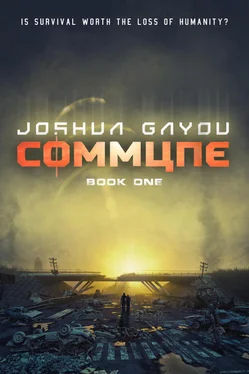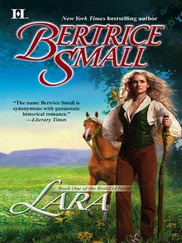“Okay, I get it,” I finally said. “You’re putting me and Lizzy out in front of him as a kind of anchor… or something. You could have told me.”
Billy glanced over at me with a “who the hell are you kidding?” look in his eyes. “You weren’t exactly in a state where I felt like that was an option when we met.”
This shut me up.
“Don’t get me wrong. I can only imagine what you and the Girly went through at the hands of those sons-a-bitches—I don’t want to know!” he exclaimed when I drew breath. “I didn’t know what to expect out of either of you. I know I didn’t expect you to be as functional as you both are so soon after you got out of there. I think you’re tougher than Jake and I put together.”
We drove on silently for a while, Billy weaving his way around the odd derelict car in the middle of the road, which had transitioned from dirt to pavement not long ago.
“Okay, so what now?” I asked. “Try to draw him out of his shell?”
“Nope. I think just let him keep hanging out with Lizzy. He’s talked more with her in the last eighteen hours than he has with me in days. I don’t know if there’s anything else you or I could do.”
I thought of how hard Jake had blushed when he fumbled at my belt and wondered.
We drove in silence for a while. The general idea was to cruise through residential areas in search of anything that looked like it could handle rough terrain and, if we turned up nothing useful, to move in closer to the 15 a little bit at a time and find more knots of traffic to try again. Billy was constantly rechecking our position against the Thomas Guide to ensure we maintained a good escape route, stopping in the middle of the street to do so. I had been through Cedar City in the past plenty of times but had stuck to the main drag for the most part; my local knowledge and usefulness as a guide increased as we came closer to the 15. Unfortunately, the 15 freeway was the major landmark Billy was doing his best to stay away from.
When we weren’t threading our way around cars, we had to work our way through barricades and various abandoned checkpoints—those relics left behind by the now absent military. We attempted to get out and clear a way through the first time we came to one that was blocking our path but soon gave up. Outside of piles of sandbags, boxes, and mounds of garbage that had blown into the area and lodged on the various parts and pieces that made up the structure of the barricades, there was razor wire wrapped around everything. Between the two of us, the effort required to make one of these obstacles passable would have taken the majority of the day.
Cedar City itself appeared to be in much better shape than some of the other places I had seen both in person and on TV. It was almost a quaint vacation getaway when compared to parts of Salt Lake City, for example, which had seen wide-scale rioting toward the end before the inhabitants became too sick to engage in such activity.
There was the occasional burned out hulk of a building; however the fires themselves appeared to have been extinguished fairly quickly—only the immediate surrounding buildings were affected. It became obvious that, wherever property damage had occurred, the people who were still capable of doing something about it had rallied together to keep things from getting out of control. I can vividly recall looking down residential area streets as we crawled by that, in isolation, appeared to depict any normal American afternoon minus the people or activity. I experienced the unsettling illusion that I was looking at a staged model or a movie set. Witnessing those pockets of sane normalcy bookended by evidence of a dying people and the Army’s best efforts to maintain control and public safety was profoundly depressing. To this day, two years later, such sights still impact me emotionally. The roads now are all cracked and overgrown with the fauna of the locale and those buildings that saw the most damage are just beginning to crumble under their own weight as nature takes back control of the land, but sometimes I’ll see a lone barbeque sitting on a porch or a rusted tricycle left in the middle of the street. Such things can still make me cry.
We eventually turned onto 265th street off Casa Loma and reset our search, driving up and down the street looking at houses as we passed. The homes in this area were nice; not large palaces of the rich like you could sometimes run into without warning, but it was clear that these people lived the comfortable lives of the upper middle class. The construction of the homes themselves lacked any kind of pattern or sense of uniformity—it became clear to me that they were most likely all custom-built, following various styles and designs. With the exception of some of the trees, which tended to be evergreen, the landscaping was universally brown and dead throughout.
“This… looks pretty good,” Billy said absently as we drove along. “Keep your eyes peeled. Some of these SUVs we’re passing are okay but let’s take our time and look for something special. We can always come back if we turn up nothing.”
I would guess that we spent an hour or so weaving our way past houses and cul-de-sacs when something finally jumped out at me.
“Stop!” I said, patting the dashboard rapidly and craning my neck to look out my window. He complied, and I said, “Back up a bit, please. I think we’re in business.”
He rolled the Dodge back forty feet or so before I signaled him to set the parking brake. “Go ahead and turn it off,” I said.
“I don’t get it,” he said. “What are you seeing?”
“That car.”
“The Toyota? You do get what we’re looking for out here, right?”
I turned back to him with my ‘don’t be a smartass’ face. “Look at the plate,” I told him.
“I ‘heart’ Moab,” he read. “What the hell’s a Moab?”
“It’s a city. It’s a major destination for off-roaders in Utah. They even used to host a yearly event where all the big time enthusiasts would get together and drive some of the nastiest trails. I’ve seen some of those guys take their Jeeps up near vertical inclines.” Billy’s eyes widened at this as he stretched his neck out to look past me again at the Toyota.
“Whoever lived here wasn’t doing any of that in a Camry,” I said, “but I’m thinking we crack open his garage and see what he’s hiding in there.”
“Ho-ho, shit,” Billy giggled. “Wouldn’t that be something?” He grabbed his shotgun and hopped out of the truck; walked around to the bed to dig around. Finding the crowbar he was looking for, he began to stroll up the driveway.
I opened the passenger side door and struggled briefly with my new rifle as I swung my legs out (Billy had so far neglected to show me how to detach the sling’s swivel studs, so I had just left it hanging off my chest the whole time). Finally situated on the ground while managing not to shoot myself, I closed the door to the truck and followed.
Billy made a straight line for the roll-up garage door, planted his feet, and positioned the crowbar just past his hips like it was a shovel that he was going to use to take a scoop out of the driveway. Before he could swing, I said, “Wait.”
He was actually mid-swing by the time I spoke, so he had to arrest the downward motion of the very heavy steel bar, grunting out a “Christ!” as he did. He straightened, placed the tip of the bar gently on the concrete, and crossed his arms over the top to lean on it. Thus composing himself, he said, “Yeeess?”
“What if someone’s in the house? What if someone still lives here?”
“What…seriously?”
“We’re here, right? We survived.”
He pursed his lips and nodded. “Yeah, fair point. It may be the end of the world, but good manners never go out of style.” He shouldered the crowbar, turned, and walked to the front door.
Читать дальше











